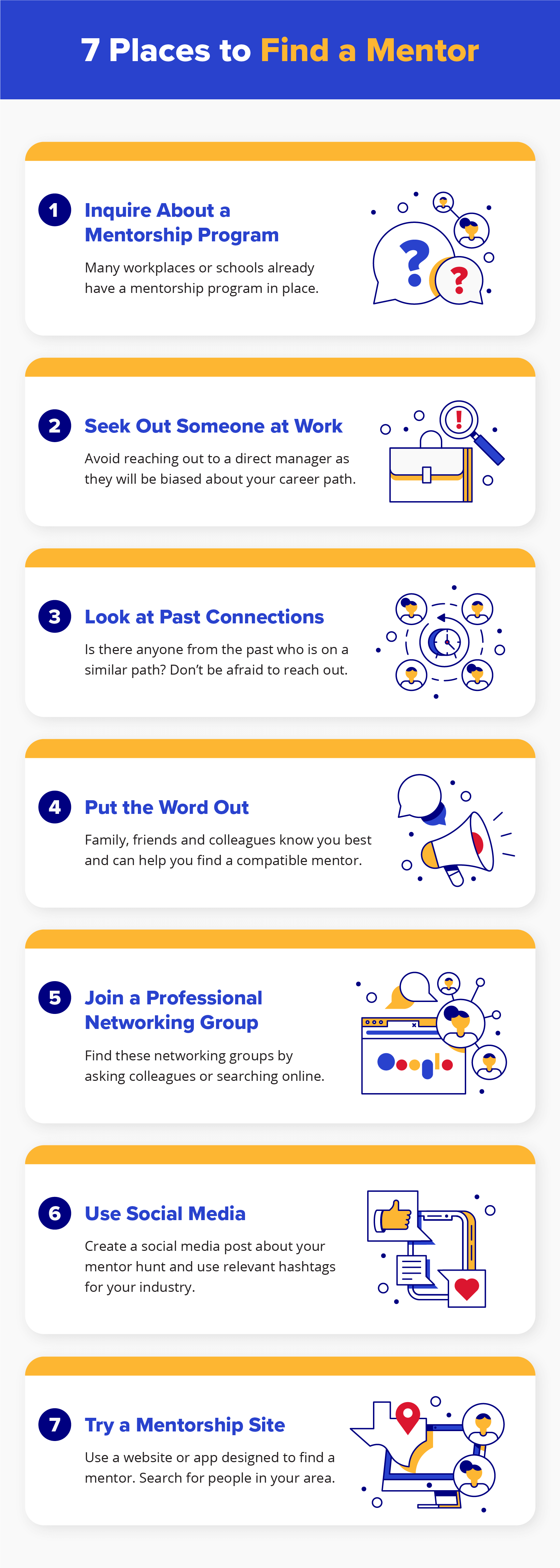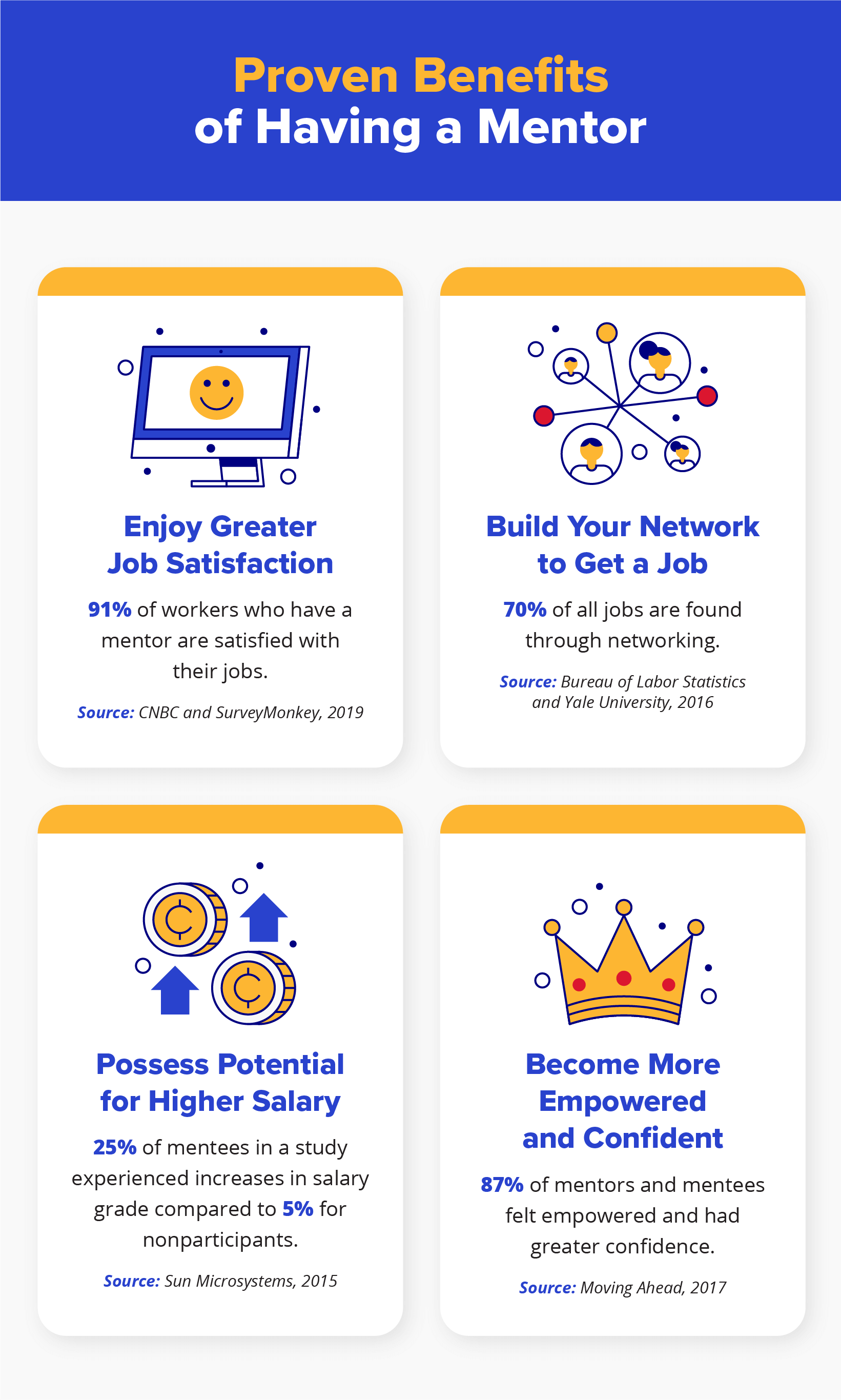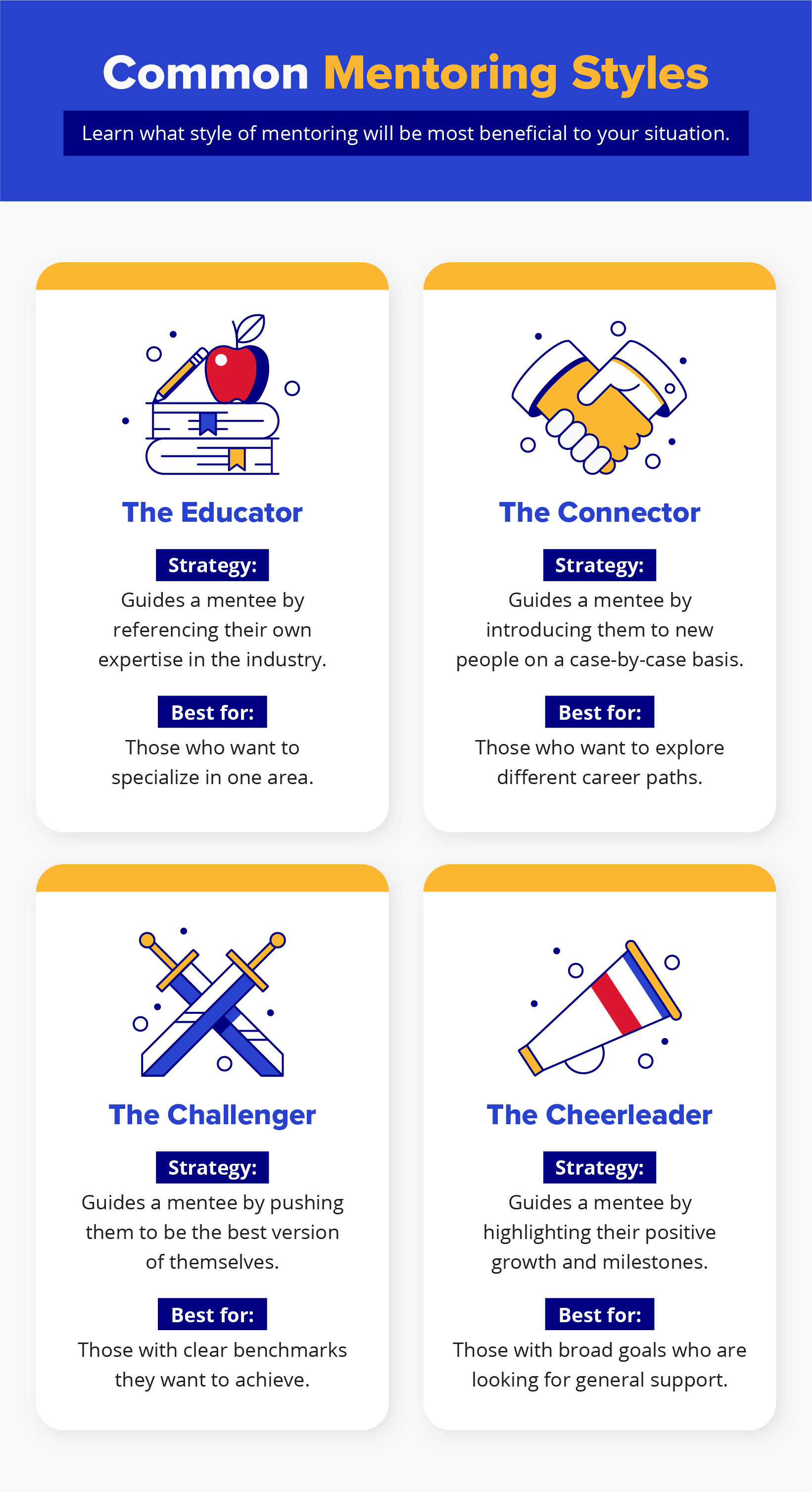How to Find a Teaching Mentor

Whether you’re at the start of your career or a veteran in the industry, there’s always room for development. However, the direction you grow in will be dependent on your motivation and support system.
Your motivation, or why you chose this path, likely existed before you applied to colleges. But a support system is something that can develop throughout a career. One way to build a network of support is by finding a teaching mentor.

Share our full infographic about how to find a life-changing mentor.
What Is a Mentor?
A mentor is a person who can support, counsel and guide someone with less experience. They typically have training in the field the mentee is interested in. Mentors are willing to share their life experiences to help their mentees grow.
Those looking for a mentor will have to find the right person to fill the role. Factors like personality, feedback style, experience and trust will influence the decision. It could take some time to find the right mentor for your unique situation.
How to Find a Mentor
An Olivet Nazarene University study found that 61% of mentor-mentee relationships developed naturally. This implies it’s common to find a mentor without exerting much effort. If you don’t already have someone in mind, here are some places to look for a mentor teacher, or a mentor who is already in the teaching profession.

1. Inquire About a Mentorship Program
Some workplaces or schools set up formal mentorship programs to guide people in a new environment. This is a reliable way to find a mentor because you will be paired with someone who has signed up for the role and understands their responsibilities.
If this opportunity is available, take advantage of it. If the pairing isn’t ideal, be clear about what you need from the mentor and take note of qualities to look for or avoid in your next mentor.
2. Seek Out Someone at Work
If an organized mentorship program isn’t available, there still might be a mentor hiding in plain sight in your workplace. A direct manager probably won’t fit this role because they are too involved in your day-to-day tasks to give unbiased career advice. However, there may be someone with more experience who can mentor and inspire you.
Those hunting for a teaching mentor might find one in the classroom next door. Look for someone who has been at the school for a while and is in a position you aspire to be in. Are you thinking about teaching a different grade or subject? Reach out to a colleague who has expertise in this area.
When looking within a workplace, be sure you find someone who has the time and willingness to be a guide. Don’t force the responsibilities of a mentorship on someone who isn’t eager to fill the position.
3. Look at Past Connections
Another way to find a mentor is to search through past connections. Think through the classes, internships and jobs you’ve held. Is there anyone from the past who is on a similar path? Don’t be afraid to reach out and see if they would be interested in being a mentor.
4. Put the Word Out
Use word-of-mouth to your advantage. Let family, friends and colleagues know you’re searching for a mentor. To facilitate the process, let them know the specific qualities you want in a mentor. Someone in your circle could connect you with the perfect person.
5. Join a Professional Networking Group
Professional networking groups consist of people who are looking to connect with others over a common profession. This environment is ripe with potential mentors. Find networking groups by asking your colleagues, searching online or looking them up on LinkedIn.
6. Use Social Media
Many professionals use social media to connect with others in their industry. This is a tool you can use to put the word out that you’re looking for a mentor. Whether you prefer LinkedIn or Twitter, find relevant hashtags that will get your post noticed by those in a similar field. For example, teachers might use these Twitter hashtags to grow their digital personal learning networks and find a mentor.
7. Try a Mentorship Site
Lastly, there are websites and apps designed to find a mentor. Some of these are free while others have a cost.
When using these services, be sure you connect with someone in a similar location as you; it will be easier to build trust with someone you can meet in person. A mentor who lives in the same area will also have a deeper understanding of the nuances that come with working in your state or school district.
What Does a Mentor Do?
A mentor’s responsibilities will depend on what you need. Once a relationship is formed with a mentor, you will be able to ask their advice based on their career.
A mentor can:
- Listen.
- Help you avoid pitfalls in your career.
- Offer encouragement.
- Give an honest opinion.
- Provide relevant anecdotes from their experiences.
- Help you explore different careers (aid with resume, networking, etc.).
- Set goals.
- Encourage you to see the big picture when it comes to a career.
- Advise on professional development and career management.
- Give relevant resources.
- Introduce you to other people in your industry.
- Help find a work-life balance.
- Inspire.
While these responsibilities might seem broad, it’s important to have someone in your corner. This is especially true if you are a first-year teacher looking for a mentor. A teaching mentor can help you handle career-defining situations that are unfamiliar to you.
Mentor vs. Teacher
The terms “mentor” and “teacher” are often used interchangeably, but they are two different roles.
A teacher is someone who educates on a specific subject or area of expertise. Teachers typically have a clear goal and a method for testing if that goal was met. Teachers help their students increase their knowledge.
A mentor is someone who advises on general life and career goals. Mentors are focused on building relationships. Knowledge is passed along informally through conversations. Mentors help their mentees grow by sharing their experiences, connecting mentees with others in their field, challenging them or rooting them on.
While these are two different roles, a person can be both. For example, a teaching mentor is a teacher who shares their life experiences with other teachers. They are a teacher to their students and a mentor to their colleagues.
Benefits of Having a Mentor
A mentor can help their mentee in many ways. Those with a mentor get support with their goals and have the potential to improve their career. Here are four proven benefits to having a mentor.

Enjoy Greater Job Satisfaction
The majority of your time is spent at work, so job satisfaction has a large role in your overall happiness. A workplace happiness survey by CNBC and SurveyMonkey found that 91% of workers who have a mentor are satisfied with their jobs. Having a mentor can help improve job satisfaction because someone is helping you reach your career goals.
Build a Network
A mentor is someone who will become a trusted member of your network. They can also connect you with other professionals, which may help you when job hunting. In fact, a report by the Bureau of Labor Statistics and Yale University indicates that 70% of all jobs are found through networking.
Possess Potential for Higher Salary
Not only are mentees more satisfied with their work, they also tend to excel and earn a higher salary. A study by Sun Microsystems found that 25% of their mentees experienced increases in salary grade compared to 5% for nonparticipants.
Become More Empowered and Confident
Mentorship may also improve your attitude and confidence. A study by Moving Ahead found that mentoring relationships caused 87% of mentors and mentees to feel empowered and have greater confidence. Having a mentor-mentee relationship could lead to increased self-assurance in your life.
How to Be a Great Mentee
Before entering into a mentor-mentee relationship, it’s important to have an idea what you need. The more specific you can be about what you want in a mentor, the more focused your search will be to find someone who is a good match.
Take the time to self-evaluate and answer these questions:
- What are your S.M.A.R.T. (specific, measurable, attainable, relevant, time-bound) goals for the next three months?
- What are your S.M.A.R.T. goals for the next year?
- Who do you admire in your industry? What is their role?
- Who do you take criticism from best? What is their personality?
- Are you ready to dedicate time to this relationship?
By answering these questions, you’ll show any future mentor you’ve thought about this role and know what you want.
Types of Mentoring Styles
When searching for a mentor, be sure you understand each style of mentoring and what will be most beneficial to your situation. While there are many types of mentors, these are four of the most common mentorship styles.

The Educator
While mentoring and teaching are two different roles, a mentor can still be an educator. The educator is typically older and wiser, and has specific expertise in an area. They can guide a mentee through difficult situations by using their experience in the industry.
The Connector
The connector’s superpower is introducing the mentee to people who are able to advise on each situation. The connector guides the mentee by introducing them to new people on a case-by-case basis. Connecting with a variety of professionals can give the mentee new and unique perspectives.
The Challenger
The challenger is someone who pushes a mentee to be the best version of themselves. Growth can be uncomfortable. The challenger may put their mentee in unfamiliar situations to accelerate their growth. Challengers are typically firm, but they are also supportive. This mentoring style works best when the mentee has clear goals or benchmarks they want to achieve.
The Cheerleader
The cheerleader is someone who highlights all the positive growth and milestones of their mentee. If the mentee experiences a misstep, the cheerleader mentor will turn it into an uplifting learning opportunity. Cheerleaders are optimistic and serve as someone the mentee can depend on to encourage them.
Asking Someone to Be a Mentor
When you find someone who could be a good fit as a mentor, you’ll want to reach out and ask them if they are interested in the position. If it’s someone you’re familiar with in your network, suggest an informal meeting. If it’s someone you aren’t familiar with, it’s best to start the conversation with an email.
Regardless of how you initiate the conversation, you’ll want to be clear about why you chose them, what your goals are and what you want to gain from the relationship.
If the person is interested, decide on a good time to consistently meet with them. Remember, it takes time to form most mentorship relationships and build trust. Don’t overcommit to a frequency of meetings you can’t maintain.
If the potential mentor is hesitant or reluctant, don’t force them into the position. Thank them for their time and go back to looking for someone who is excited to impart their wisdom to you.
Final Thoughts
A mentor can have a big effect on your career, but the relationship takes time to foster. Be sure you understand the role of a mentor before searching for someone for the job.
Even the most productive mentorship relationships can come to a close. Someone may be a mentor for a portion of your career, until you outgrow them. Or you may be starting a new chapter, such as pursuing a new online degree, and need someone with different expertise to mentor you. Be sure to reevaluate your goals and your current mentor every few years. If it’s not a mutually beneficial relationship, it might be time to start fresh.

